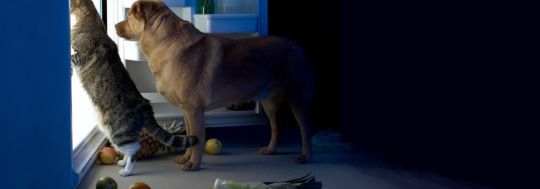The Best Pets for Renting

To allow pets or not to allow pets? It’s a tough choice. Some landlord insurance policies will cover damage created by your tenants’ pets, while others won’t – and many policies only cover damage caused by certain animals.
Let’s say you’re covered for it, and you’re an animal-lover at heart. Should you still draw the line somewhere? Join us at the Canstar zoo to find out what pets are no trouble for your tenant to keep, and what pets are an investment risk.
Things you should know about landlord cover for pets
Landlord home and contents cover usually requires a few things in order for you to be covered for damage caused by a tenant’s pet. A quick perusal of a few landlord insurance products disclosure statements suggests that some tenant responsibilities are commonly :
- The tenant must own the pet – no “dog-sitting” damage will be covered.
- You must have agreed to the pet’s presence, and the pet must be specifically listed on the tenant’s lease.
- You must have charged a Pet Bond to the tenant.
- The pet is not a reptile or livestock. (For more on that, read on.)
Adorable and manageable animal buddies
Fish
Seriously, there is nothing to worry about when it comes to fish. Unless you live in an earthquake-prone area, they’ll just swim around happily in their tank.
Mice and rats
Did you know you can train a rat just like a dog? They’re that intelligent. And they actually keep themselves nice and clean, unlike popular mythology would tell you. If they’re kept in a cage or other enclosure, you don’t need to worry about droppings.
Hermit crabs
Low maintenance, low mess. The worst you could expect is a bit of sand in your carpet.
Guinea pigs
Obviously, your tenants can only have guinea pigs if your investment property is a house with its own shady backyard. Their poo is a nice fertiliser. Just think carefully if you don’t have much grass. Guinea pigs can absolutely ruin a yard if they don’t get rotated often enough.
Small, well-trained dogs
Take the Optimum Dog Advice selector quiz to find out what dogs might or might not work at your investment property. We did the quiz using pretty strict answers, and came up with a shortlist of dogs that might work in a small apartment where noise and shedding would be a problem – the Poodle, Bichon Frise, or Griffon Bruxellois. Even a Pug or French Bulldog can be a good choice because they have low activity needs and they don’t usually bark or destroy things on a whim. Cavalier King Charles Spaniels are good apartment dogs once they’re house-trained, but they do not make that task easy for their owners.
Indoor cats
Indoor cats don’t collect fleas from the outside world, and they are typically fairly inactive breeds, so they’re usually no trouble. Also, cats are easier to house-train than dogs. Take the Optimum Cat Advice selector quiz to find out what cats might or might not work at your investment property. We took the quiz and found a very long list of cats that might work in a small apartment where noise and shedding would be a problem, from the British Shorthair to the Ragdoll to the Russian Blue.
Troublesome critters
Big dogs and intelligent dogs
There are too many to list, but you know the type of dog that would be trouble in an apartment. Dogs that are big and/or intelligent usually require more activity, so they get bored when their owner is away at work and, well… Oh, and don’t forget chihuahuas – a tiny dog with a big mouth!
Outdoor cats
Outdoor cats, lovely creatures that they are, tend to bring their owners a wide range of presents they fincd in the outside world. Dead animals, mud and leaves, and fleas are just a few of the things your tenant’s cat might drag in. They don’t say “Look what the cat dragged in” for nothing.
Birds
Most birds love to talk, which translates to them being a noisy pet at inconvenient times of day, like sunrise. The other problem is that lots of birds even learn to speak human words – parakeets for example can learn up to 100 words. That’s fine until your tenant’s 10-year-old son teaches the parrot to swear. You can field a lot of complaints from your tenant’s neighbours until finally you have to kick them out, or you can say from the beginning, “Sorry, no birds.”
Lizards or tortoises
The only thing wrong with reptiles is that they are usually not covered under landlord insurance. From the gecko to the bearded dragon, lizards are becoming more popular pets, because they are low fuss – but even landlord insurance specialist Terri Scheer excludes reptile damage from cover.
As for snakes, we are perfectly happy with them being excluded from cover. They do nothing but eat and sleep, sure, but if they ever get out of their enclosure, they can make a new home in the walls or roof of your or your neighbour’s property.
Find the policy that suits your investment property
and your financial situation at Canstar






